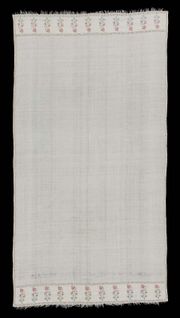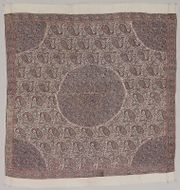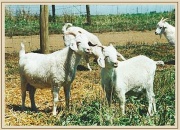Difference between revisions of "Cashmere"
| (5 intermediate revisions by the same user not shown) | |||
| Line 1: | Line 1: | ||
| − | [[File: | + | [[File:Kashmir shawl 45540.jpg|thumb|Kashmir Scarf<br>MFA# 45.540]] |
== Description == | == Description == | ||
| − | The fine, downy undercoat obtained from the | + | The fine, downy undercoat obtained from the domesticated goat, ''Capra aegagrus hircus'', originates in the high altitudes of the Tibetan plain, the Changthang plateau adjacent to Ladakh, and high desert regions of Central Asia, western China and Mongolia. However, it was the skills of Kashmiri weavers that processed the fiber into fine shawls and other items of clothing. The fiber was known locally as pashm, and the woven product pashmina. When introduced to the west in the late 18th, early 19th century, is was called cashmere. By the 19th century, shawls made from cashmere were very popular in Europe and Great Britain. Cashmere wool is naturally a white, gray or tan color. The goats molt each spring and the hair is collected, sorted into the coarser outer hair and the soft downy undercoat. Because each goat only produces about 4 ounces of undercoat each year, it is very expensive. Cashmere fibers are silky and fine with moderate strength and good resiliency. They are used for high quality clothing, shawls, gloves, and sweaters. |
| − | [[File: | + | [[File:Cashmere Shawl 15503.jpg||thumb|Moon Shawl (chandar)<br>MFA: 15.503]] |
== Synonyms and Related Terms == | == Synonyms and Related Terms == | ||
| Line 14: | Line 14: | ||
* Fiber length = 5.0-12.5 cm (outer); 2.5-9.0 cm (undercoat) | * Fiber length = 5.0-12.5 cm (outer); 2.5-9.0 cm (undercoat) | ||
* Diameter of undercoat is about 15 micrometers with 5-7 scales per 100 micrometers | * Diameter of undercoat is about 15 micrometers with 5-7 scales per 100 micrometers | ||
| − | + | [[File:image3_cashmere.jpg|thumb|Kasmire goat]] | |
| − | == | + | == Risks == |
Damaged by alkalis. | Damaged by alkalis. | ||
| − | |||
| − | |||
| − | |||
| − | |||
== Comparisons == | == Comparisons == | ||
| Line 35: | Line 31: | ||
</gallery> | </gallery> | ||
| − | == | + | ==Resources and Citations== |
| + | * G.Cook, ''Handbook of Textile Fibres:I. Natural Fibres'', 5th edition, Merrow Publishing Co., Durham, England, 1984. | ||
| + | |||
| + | * Contributions, Meredith Montague, Museum of Fine Arts, Boston. | ||
* Hoechst Celanese Corporation, ''Dictionary of Fiber & Textile Technology'' (older version called Man-made Fiber and Textile Dictionary, 1965), Hoechst Celanese Corporation, Charlotte NC, 1990 | * Hoechst Celanese Corporation, ''Dictionary of Fiber & Textile Technology'' (older version called Man-made Fiber and Textile Dictionary, 1965), Hoechst Celanese Corporation, Charlotte NC, 1990 | ||
Latest revision as of 14:54, 20 May 2022
Description
The fine, downy undercoat obtained from the domesticated goat, Capra aegagrus hircus, originates in the high altitudes of the Tibetan plain, the Changthang plateau adjacent to Ladakh, and high desert regions of Central Asia, western China and Mongolia. However, it was the skills of Kashmiri weavers that processed the fiber into fine shawls and other items of clothing. The fiber was known locally as pashm, and the woven product pashmina. When introduced to the west in the late 18th, early 19th century, is was called cashmere. By the 19th century, shawls made from cashmere were very popular in Europe and Great Britain. Cashmere wool is naturally a white, gray or tan color. The goats molt each spring and the hair is collected, sorted into the coarser outer hair and the soft downy undercoat. Because each goat only produces about 4 ounces of undercoat each year, it is very expensive. Cashmere fibers are silky and fine with moderate strength and good resiliency. They are used for high quality clothing, shawls, gloves, and sweaters.
Synonyms and Related Terms
kashmir; tus (India); Kaschmirwolle (Deut.); cachemire (Fr.); casimir (Esp.); cachemira (Esp.); kasjmier (wol van de kasjmier geit) of cashemire (Ned); pashmina; pashm;
Physical and Chemical Properties
- Fiber cross section is circular or oval with nearly invisible medulla
- Fiber length = 5.0-12.5 cm (outer); 2.5-9.0 cm (undercoat)
- Diameter of undercoat is about 15 micrometers with 5-7 scales per 100 micrometers
Risks
Damaged by alkalis.
Comparisons
Additional Images
Resources and Citations
- G.Cook, Handbook of Textile Fibres:I. Natural Fibres, 5th edition, Merrow Publishing Co., Durham, England, 1984.
- Contributions, Meredith Montague, Museum of Fine Arts, Boston.
- Hoechst Celanese Corporation, Dictionary of Fiber & Textile Technology (older version called Man-made Fiber and Textile Dictionary, 1965), Hoechst Celanese Corporation, Charlotte NC, 1990
- Rosalie Rosso King, Textile Identification, Conservation, and Preservation, Noyes Publications, Park Ridge, NJ, 1985
- Edward Reich, Carlton J. Siegler, Consumer Goods: How to Know and Use Them, American Book Company, New York City, 1937
- Wikipedia: http://en.wikipedia.org/wiki/Cashmere_wool (Accessed Oct. 18, 2005)
- G.S.Brady, Materials Handbook, McGraw-Hill Book Co., New York, 1971 Comment: p. 154
- Random House, Webster's Encyclopedic Unabridged Dictionary of the English Language, Grammercy Book, New York, 1997
- The American Heritage Dictionary or Encarta, via Microsoft Bookshelf 98, Microsoft Corp., 1998





